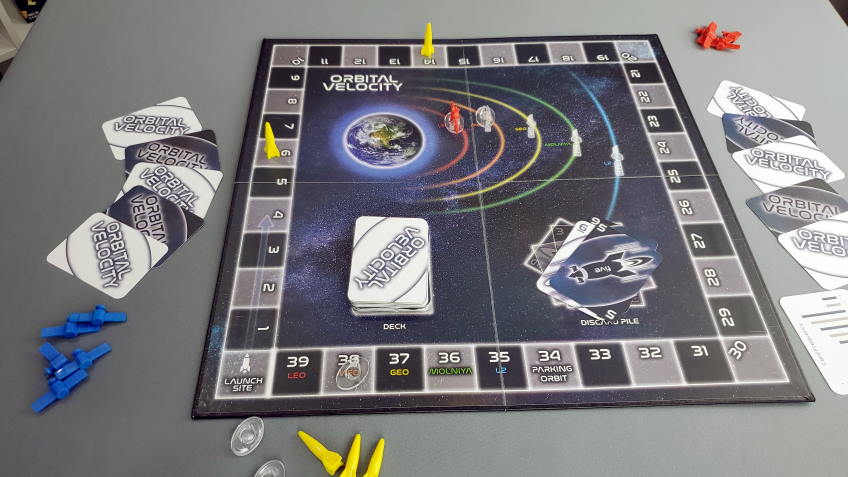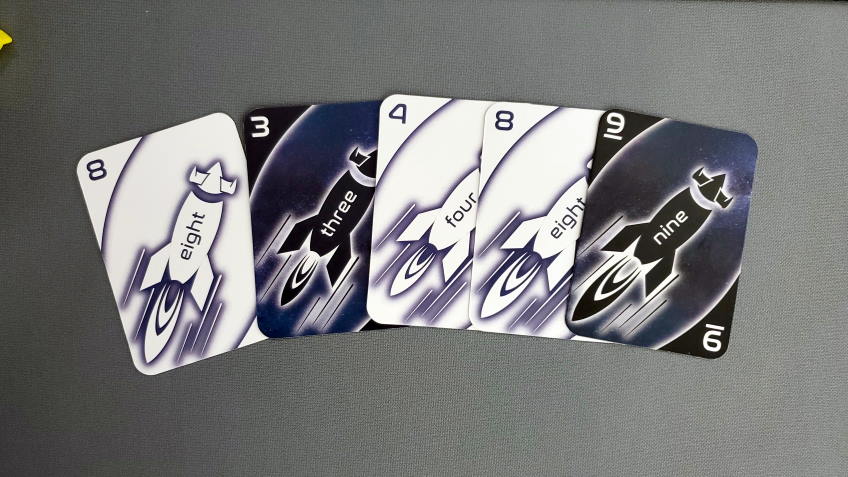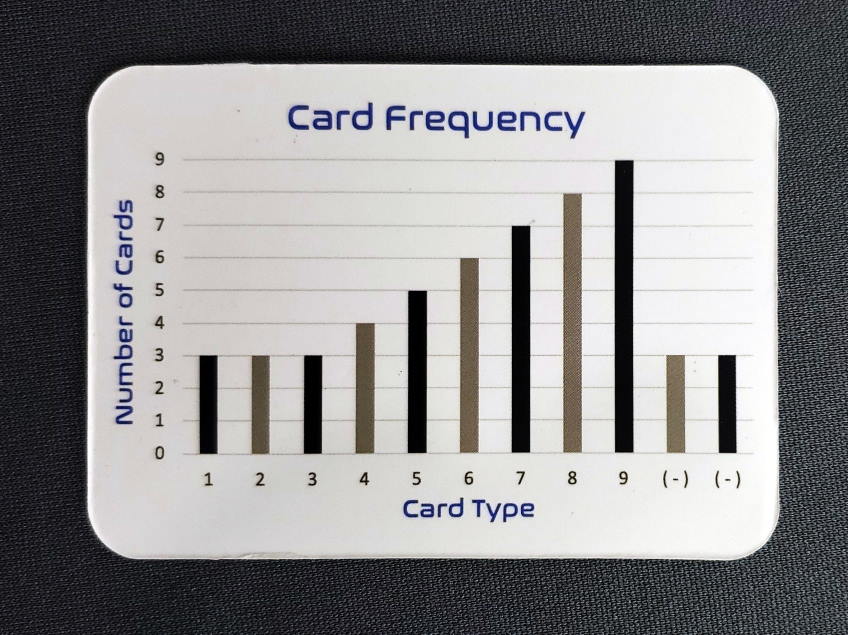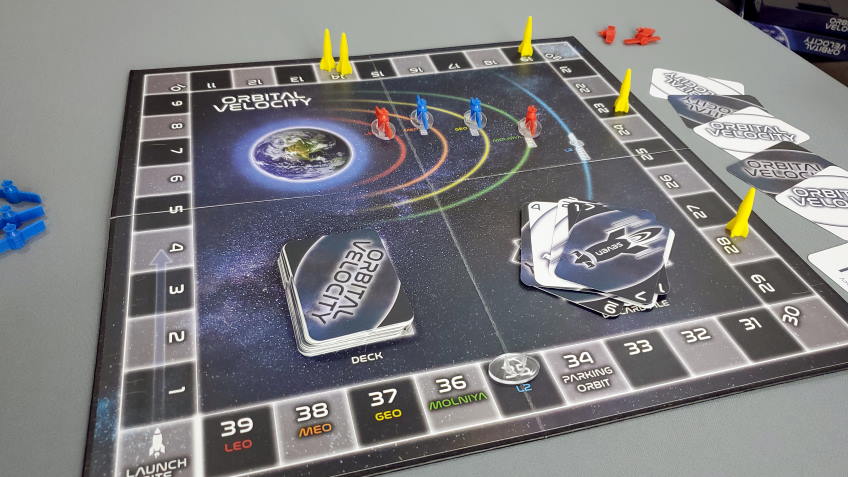
WE PLAY 2 LEARN
Game Ratings
FAMILY
7
YOUNG KIDS
6
OLDER KIDS
7
ADULTS
8
Overview
| Players | Playing Time | Best Age | Educational |
| 2 or 4 | 10 - 20 minutes | 9 - Adult | Addition Science |
| Skill | Luck | Strategy | Social | Game Type | Play Style |
| 70% | 30% | 50% | 50% | Board/Cards | Competive |
Orbital Velocity is a fun blend of game styles not often seen together. It combines deeper strategic thinking with risk taking and a dash of bluffing. And it does this while being fast paced and quick to play. This independently published game might not appear to keep up with the latest artwork trends, but it makes up for this with such unique gameplay.
We also like that Orbital Velocity includes great educational elements. Addition and probability are seamlessly built into the gameplay and contribute to the fun of the game, instead of being shoe-horned in. Even better, there is real science in this game and it's not just a theme here as is the case with most other "space" games. This science is woven into the game mechanics so well you likely wouldn't even realize it's there. But differing target velocities, parking orbits, and acceleration challenges are subtle ways real rocketry principles show up in the game.




How to Play
Official Rules
You can see the rules in the creator's video here.
Enhanced Rules
This is one of the few games for which we have not used custom rules.
Fast Facts
How many players?
- Playable with 2 or 4
- Best with 2 or 4
This is a head-to-head game; it can only be played 1-vs-1 or 2-vs-2. And while the mechanics of the game do not change if playing with 4 players instead of 2, the game experience will feel very different. This is a very strategic game and in a 4 player game teammates can only communicate where the other team can hear them. This creates a new dynamic not present in the 2 player game.
What ages can play?
- Playable for ages 7 to Adult
- Best for ages 9 to Adult
The first round of this game will seem overly simplistic and anyone able to add two-digit numbers will, in theory, be able to play the game. However, the next rounds will reveal a strategic element that most kids won't grasp until ages 9 or 10. With that being said, younger kids will enjoy the space theme and should be able to understand the basic mechanics of the game. So even younger kids could play as long as they're matched with other kids of a similar skill level, the game will just feel more luck based without the strategy behind it.
Can different skill levels or ages play together?
Yes and No. Young kids would not be able to compete well against older kids or adults because of the subtle nuances in strategy needed to play this game well. However, once a kid can grasp these strategic elements, there is enough luck involved that older kids and adults would be fairly evenly matched playing against each other.
How long does it take to play?
10 - 20 minutes
Will we get bored after a few games or does it have good replayability?
This game is very replayable. The fast pace and quick game time will help with this. There is also enough luck in the order cards are drawn that no two games will be the same.
Setup/Cleanup
How much work is it?
Low.
Would kids be able to do it on their own?
Yes, setup is nice and simple.
Will parents have fun too...
...when playing with the kids?
Yes, as long as the kids are old enough to understand the underlying strategy.
...without the kids?
Yes, this is a fun and interesting game for adults. Especially for those that like fast paced games that include some of the different aspects to this game (strategy, risk taking, bluffing).
Educational Value
What skills will this game help develop?
Addition
This game is fantastic practice for adding up to two digit numbers. And because of the fun theme and fast paced gameplay, it doesn't come across as work to do this.
Science: Orbital Mechanics
Most games with a science theme go one of two ways. They may have a science "theme" but unrelated gameplay, or they beat you over the head with the science at the expense of a fun game. Orbital Velocity is neither of these. It does a very nice job of subtly weaving real science into fun game mechanics. Different required target velocities, hitting the velocity exactly, and the names of the orbits are all true to orbital mechanics. One of the best examples is in how many cards are available for each number. There are many more high number cards because it is easier to make large changes in rocket acceleration than small ones. This feels like an arbitrary mechanic to make the game more interesting but is based on the actual science. And for the real science buffs, the instruction booklet does include a couple pages explaining the science in more detail.
Probability
Understanding there are more high number cards in the deck and how that should impact which card you play each turn is an important part of the strategy in this game. This does a good job driving home the idea of probability. Know that helpful reference cards are included showing the exact distribution of each number card in the deck to help with this.
But will my kids actually have fun playing it?
Yes, as long as they are old enough to understand the strategy required.
Custom Rules
This is one of the few games we have not felt a need to customize.
Do you use custom rules we haven't thought of? If you have found some other ways to customize the rules, please share them with us through our Contact page. We're always interested in new ways to improve gameplay.
Where to Buy
Similar Games
If you like this game, we suggest these others
Or check out our full list of Reviews where you can sort by any of these categories
We are a participant in the Amazon Services LLC Associates Program, an affiliate advertising program designed to provide a means for us to earn fees by linking to Amazon.com and affiliated sites




